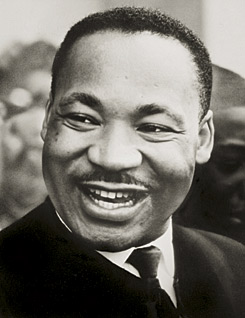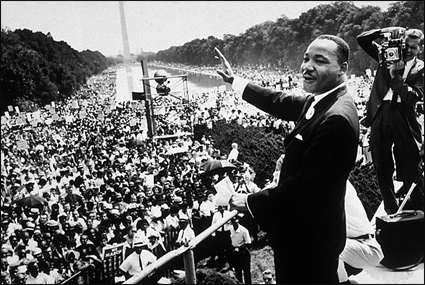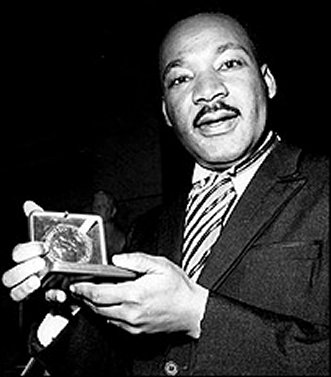
Martin Luther King, Jr., (January 15, 1929-April 4, 1968) was born Michael Luther King, Jr. in a family of Baptist Ministers. His grandfather began the family’s tradition as pastors, followed by his father and from 1960 until his death Martin Luther acted as co-pastor to his father. He graduated from high school at the age of fifteen; he received the B. A. degree in 1948 from Morehouse College. He received his Ph.D at Boston University’s School of Theology in 1955 and married Coretta Scott in 1953. They had two sons and two daughters.
He is best known for being an iconic figure in the advancement of civil rights in the United States and around the world, using nonviolent methods following the teachings of Mahatma Gandhi. While studying in Pennsylvania, King heard a lecture on Mahatma Gandhi and the nonviolent civil disobedience campaign that he used successfully against British rule in India. Over the next few months King read several books on the ideas of Gandhi, and eventually became convinced that the same methods could be employed by blacks to obtain civil rights in America. He also visited India in 1959, where he learned more of Ghandi’s ideas.
Martin Luther’s leadership skills include:
Communication: which is reflected in the way he organized meetings and marches around the country, as well as the manner in which he expressed himself in Speeches and the white oppressors.
Charisma: Power to attract people by way of speaking.
Vision: he was a man of vision land let nothing hinder him from what he started. He was determined to see the end result, which was for all people to have equal treatment
Persistence: As a leader, Martin Luther did not let his suffering stop him. He was jailed and assaulted many times, but always continued with his fight.
Respect: We all know that many people do not respect other religions and culture, or they are reluctant to follow other people’s believes. Martin Luther was a Christian Minister, but because of his respect for Ghandi he achieved what he wanted, because he obviously agree with him that peace is the key. It shows that all people can work together in peace, regardless of culture and believes
Civil Right Activism
Three events were very important to launch Dr. Martin Luther King Jr. as a leader.
Montgomery Bus Boycott
The first one was the Montgomery Bus Boycott that happened when King was a pastor in the city Montgomery, Alabama. That boycott was against the racial segregation on public transportation. In 1953, Rosa Parkes, an African America woman, refused to give up of her bus seat to a white passenger. As a consequence she was arrested for violating the segregation law. The boycott lasted 385 days, when finally, the Unites States District Court ended the racial segregation on all city’s public buses.
Southern Christian Leadership Conference-SCLC
The second important moment was when King set up the Southern Christian Leadership Conference- SCLC which was a way to operate throughout the South of the country, as well as a national platform to their speeches. Even moving in 1960 to his native city, Atlanta, King could dedicate intensively to SCLC.
The Letter from the Birmingham Jail
Martin Luther King was in Birmingham (Alabama) in 1963 in one of his campaign to end segregation at lunch counters and in hiring practices. Again, he was arrested and from the jail he wrote a great letter with perfect eloquence where he demonstrated his philosophy of nonviolence.
I Have a Dream Speech
The most famous and remarkable speech of King, “I have a dream”, took place on August 28, 1963 during the March on Washington for jobs and Freedom. About 200,000 people was present at the March which demanded equal justice for all citizens under the law. In his speech, King emphasized his faith that all men, someday, would be brothers.
“I have a dream that one day on the red hills of Georgia the sons of former slaves and the sons of former slave owners will be able to sit down together at the table of brotherhood”

Political Influence
As a result of King’s civil rights agitation, specially after his speech in the March which had strong effect in national opinion, the Civil Rights Act was finally passed in the American Congress ending the segregation in public accommodations and outlawing discrimination in publicly owned facilities, as well as in employment. In addition, in 1965 when the Congress passed Voting Rights Act, ending disenfranchisement of African-Americans, from that time every one in America is free to vote.
OTHER ACTIVISM
King wasn’ t activist only in civil rights and political issues. He campaigned for economic justice as well as for peace.
Poor People’s Campaign
One of his attempts to end the poverty was the Poor People’ s Campaign he organized in 1968. He wanted to collect “multiracial army of the poor” all across the country that would march in Washington D.C. and with this nonviolent civil disobedience make president Lyndon B. Johnson and the Congress pass a bill of rights for poor Americans. He wanted the Congress help the poor get jobs, health care and decent homes.
Unfortunately, only weeks before the march was to take place, King was assassinated. His wife and supporters – Rev. Ralph Abernathy and Jesse Jackson decided they would lead the march themselves. On May 1968 around 50.000 people gathered and marched in Washington D.C. However, this campaign was considered a failure as no immediate changes had been seen.
Opposition to the Vietnam War
King was also strong opponent of the Vietnam War. Exactly one year before his death he delivered a speech “Beyond Vietnam”. He described USA as “the greatest purveyor of violence in the world today” and he accused it of killing million Vietnamese “mostly children”. He said that the country needed large moral changes as it was spending more money each year on military purposes than rather on o social welfare. He said that this way it is “approaching spiritual death”.
King also stated, in his “Beyond Vietnam”, speech that “true compassion is more than flinging a coin to a beggar … it comes to see that an edifice which produces beggars needs restructuring”.
AWARDS
In 1964, King became the youngest person to receive the Nobel Peace Prize for his work to end racial segregation and racial discrimination. Time magazine named him a Man of the year of 1963 – the year he addressed “I have a dream speech”.

In the same year he accepted the American Liberties Medallion by the American Jewish Committee for his “exceptional advancement of the principles of human liberty” (in acceptance speech he said: “Freedom is one thing. You have it all or you are not free”). After his death in 1977 he received
the Presidential Medal of Freedom was awarded to King by Jimmy Carter.
King was awarded at least fifty honorary degrees from colleges and universities in the U.S. and around the world.
LEGACY
Generations after Martin Luther King Jr. have looked at this man as a courageous civil rights advocate, supporter of non-violence, economic justice and human rights. King’s charisma, steadfastness, spiritual background and eloquence are remembered for helping establish himself as a visible, respected leader. He was the youngest person to be awarded the Nobel Peace Prize in 1964.
His legacy involves The King Center, the official, living memorial dedicated to advancing the legacy of Dr. Martin Luther King, Jr., which was established in 1968 by his wife, Coretta Scott King. The center functions as library and archive of his work, place for leadership development, training, support of social change and nonviolence. MLK Jr. Day was established as a federal holiday in 1983 after years of campaigning, petitioning and lobby across the country. On the third Monday of January, MLK Jr. Day is a national humanitarian service day and highlights the remembrance and celebration MLK Jr.‘s philosophies.
CONTROVERSY
What’s interesting though is the mythical status given to MLK Jr. and his profile as a leader. He was seen as the center of the movement, which led to great praise but also concentrated hate-filled attacks and his eventual assassination in 1968. There were a number of controversies surrounding him during his life and after death.
–King declined his participation in the freedom rides to Mississippi with the Student Non-violent Coordinating Committee, which cause some blacks working in the civil rights movement to call him “De Lawd,” mocking his high status in the community. Activists also criticized him for refusing to support militantism to achieve their goals.
–The FBI been suspicious about potential influence of communists in social movements such as labor unions and civil rights even though MLK Jr denied allegations of being a Communist sympathizer or member of the Communist party. Many supporters of King saw this as a way to discredit the civil rights movement.
-King was also attacked on his fidelity and rumors abounded that he had cheated on his wife.
Nesima Aberra, Andreza Andrade, Taati Niilenge, Elena Strapkova

I loved how your group was able to add new insight and new information about such a familiar person. It was very well done!